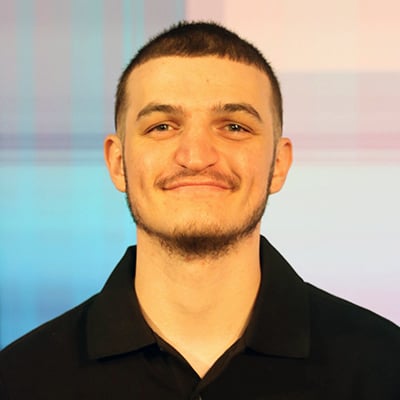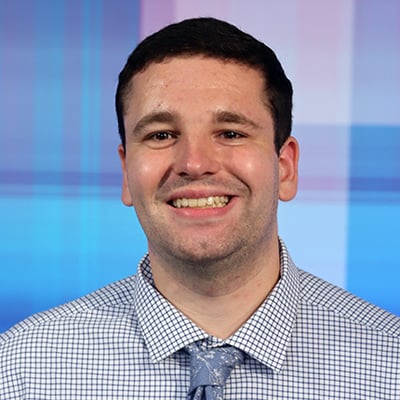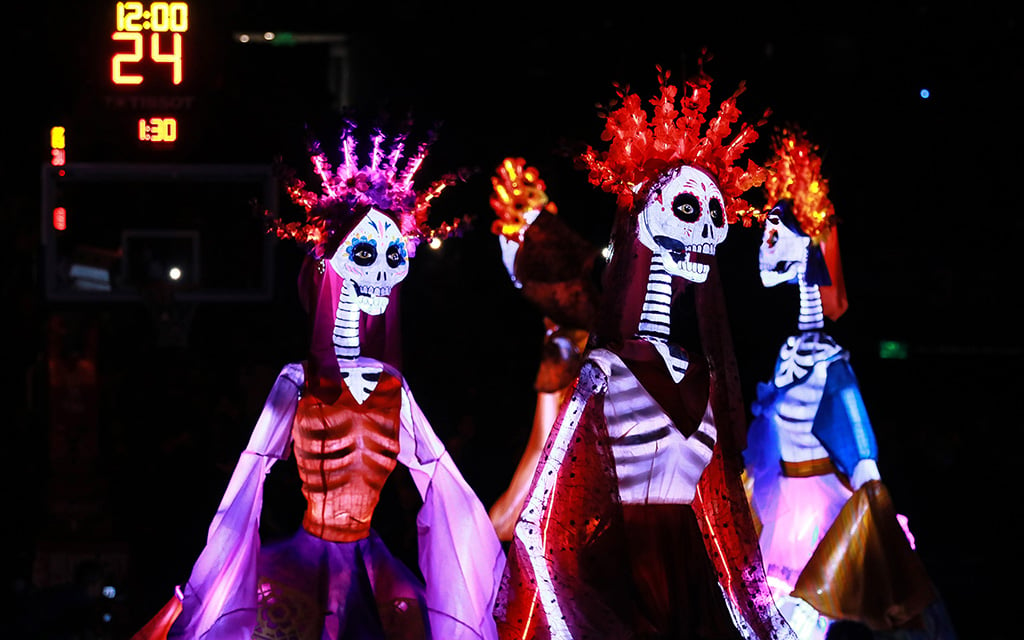PHOENIX – As Spanish music and vibrant accompanying lights filled Footprint Center throughout a 103-97 Phoenix Suns victory over the Portland Trail Blazers Saturday, the Suns and their fans celebrated more than just a win.
The game was played on the Suns’ ninth annual Dia de los Muertos night, celebrating a Mexican holiday that shows respect and appreciation for the dead. The Suns Dance Team members wore face paint depicting a calavera – sugar skulls – and performed alongside folklórico dancers at halftime.
Theme nights like these are part of a larger effort by the Suns and the NBA to embrace Hispanic culture – and appeal to the league’s growing Hispanic fan base.
“The NBA’s growth in the Hispanic community has expanded from the Valley of the Sun in Arizona to Mexico,” said Arturo Ochoa, the Suns’ Spanish play-by-play broadcaster. “The growth has happened thanks to the inclusion of multiple games and events in Mexico City and Monterrey in the past years, where they saw development.”
This past weekend, the Miami Heat played against the Washington Wizards in the NBA’s 14th Mexico City Game. It was the first time that Heat forward Jaime Jaquez Jr., who is of Mexican descent, played in an NBA game in Mexico, where his grandfather was born.
“The support I felt and the atmosphere surpassed my expectations because of all the love the fans showed to me and my family,” Jaquez told reporters after the Heat’s 118-98 victory over the Wizards. “It was great signing autographs and feeling their affection.”
Throughout the NBA’s 78-year existence, Hispanic and Latino cultures have been under-appreciated, despite the significant number of fans from those communities, especially in markets such as Phoenix, Miami, Los Angeles, Houston, Dallas and San Antonio.
Hispanics represented 21.1% of fans that attended or watched NBA games last season, according to Statista, making them the second largest demographic among NBA fans behind Caucasians. However, Hispanic players only accounted for only 2.2% of the league’s players in 2023, the most recent numbers provided by Statista.
Ahead of the NBA’s 33rd-ever (preseason or regular season) game in Mexico City, commissioner Adam Silver spoke on the league’s effort to connect to this demographic and grow the sport in Mexico, whether it be through more games in the country or even expansion.
“We’re working closely with the community here,” Silver said in a press conference. “We see an opportunity to potentially expand the footprint of the NBA, whether in the United States or potentially here in Mexico City. Personally, I would love to have a team in Mexico City.
“We’re thinking hard … how we can do more over time, particularly here in Mexico City and Mexico.”
While expansion can take a while to actualize (especially out of the country), the NBA has made considerable progress toward expanding the game across the southern border. In 2019, the NBA established its first G League team in Mexico – the Mexico City Capitanes – and opened the league’s first NBA Store in the heart of Polanco in Mexico City.
In the states, the league has made a concerted effort to connect to the Hispanic community through theme nights, promotions and featuring Hispanic players such as Suns guard Devin Booker and the Heat’s Jaquez.
In recent seasons, the Suns have played host to an “El Valle” theme night. For those games, they wear their “El Valle” themed alternate uniforms. Last season, the In-game hosts (who are also Hispanic) indulged the crowd with Mexican-themed competitions and Mexican-born rapper and singer, MC Magic, who grew up in Avondale, performed at halftime.
Additionally, the Heat created a promotional brand called “Dale HEAT” which features specialty basketball courts and merchandise themed around popular Hispanic phrases. Jaquez wore a custom-made Spanish Heat jersey when he participated in the 2024 NBA All-Star Dunk Contest.
The team also participates in “Calle Ocho” which is the world’s largest Latin music festival that goes through 15 street blocks with musical stages, international food and dancing. The event is home to the Guinness World Records’ longest conga line, which consisted of 119,986 people gathered in Miami, Florida, on March 13, 1988.
The first NBA player of Hispanic or Latin heritage to be drafted and play in the league was Puerto Rican-born guard Alfred “Butch” Lee who entered the league in 1978. Since Lee, players like Nenê, Leandro Barbosa, J.J. Barea, Luis Scola and Manu Ginóbili have become staples in league history.
Like Jaquez, Booker is one of just a handful of active players of Mexican descent. His mother, Veronica Gutiérrez, instilled Hispanic culture in him at a young age and his connection to it came full circle upon being drafted by Phoenix in 2015.
“It’s super important to me,” Booker said of his Hispanic heritage. “I think it was a silver lining to me when I came (to Phoenix). It was just destined to be. To tap back into my culture, it’s been an unbelievable experience. I’ve learned so much and I’m going to continue to.”
Booker’s fusion with Phoenix’s Hispanic culture was never forced and is unlike any other NBA team, according to Arturo Ochoa, Suns’ Spanish play-by-play announcer of over 20 years.
“The Mexican-American community, above all, regarding Devin Booker…is with the team 100 percent,” Ochoa said through an interpreter. “And I believe that in none of the other 29 teams there is more support for those types of people.
“But the team didn’t solely do all that. (Booker) is all natural. He likes those types of (lowrider) cars. The team didn’t force him to do anything. He’s natural. That is a big difference.”
The NBA also has a strong representation within the Dominican community with the likes of Lester Quinones, Karl-Anthony Towns, Al Horford, and Chris Duarte.
Quinones, who plays at guard for the Philadelphia 76ers, was born in Brentwood, New York, but his mom’s side of the family is from the Dominican Republic. He has been surrounded by strong ties to Dominican culture since the moment he was born.
“From when I was born up until about 5 years old, I was around my grandmother who didn’t speak any English.” Quinones said, “It’s the reason why I always want to show my love and support for the (Dominican) culture by posting on social media and talking about it in interviews.”
Quinones is grateful for the support that he has received from the community and is proud to join the other players mentioned in serving as leaders for fans of Dominican descent.
“Going back to the Dominican Republic earlier this summer and seeing how the kids look up to me meant everything to me,” Quinones said. “They follow how I move, how I dress, what I wear, and how I speak. It’s amazing to have the opportunity to be a role model along with guys like KAT and Duarte repping the flag at the biggest stage. My advice to them is just to keep chasing your dreams.”
Hispanics were nearly one-third of Arizona’s total population in 2021 (2.4 million), according to the Arizona Hispanic Chamber of Commerce’s annual DATOS research study that records the state of Arizona’s Hispanic market. That census revealed that 1.7 million of Arizona’s Hispanic population resides in Phoenix.
Naturally, the Latino community has been a key target demographic for the Suns. In 2010, the Suns protested against Arizona’s SB 1070, a stringent, far-reaching anti-immigration law, by wearing their “Los Suns” jerseys in a playoff game against the San Antonio Spurs.
The protest, backed by then-owner Robert Sarver, drew criticism from some, but Sarver defended it.
“Arizona’s already struggling economy will suffer even further setbacks at a time when the state can ill-afford them,” Sarver said in a statement denouncing the legislation.
The Hispanic community has been an integral part of Arizona’s economy in the last decade. And that growth is bleeding into Phoenix’s sports fandom. From 2010 to 2020, the Latino workforce doubled that of non-Latinos, according to DATOS.
Currently, the NBA employs 1,173 employees and 18.1% of them are Hispanic. The hope is to grow that number by informing the younger generation of the job opportunities that exist with professional teams.
“I went to a bilingual elementary school and I go back from time to time to speak to the youth,” said José Pañeda, Miami’s Spanish radio broadcaster. “I talk about how I sat where they are sitting and if you have a dream it may not be probable, but it’s possible – especially for the younger kids who want to be a star in football, basketball, baseball, or another sport. It’s very difficult, but there’s other opportunities within a sports organization.”
The NBA’s ties to Hispanic culture extend beyond players, coaches and fans. Multiple teams have Spanish-speaking broadcasters to provide commentary in both radio and television.
Among the notable Spanish broadcasters is Pañeda, who is one of the longest-tenured Spanish broadcasters in the NBA. He is in his 37th year with the Heat organization. Pañeda is one of the original Heat employees from the team’s inception in 1987, but he didn’t start as a broadcaster. Instead, he got his start serving as a ticket sales representative.
“I got my foot in the door, through a friend of a friend, who was looking for help to gather the 10,000 season ticket requirement that is mandated to start a (NBA) franchise,” Pañeda said. “In our (Miami) community, it’s prevalent on the Hispanic side.
“I was the only Spanish-speaking person that was knocking on doors. I received $5 for every $95 deposit. It wasn’t much, but it got my foot in the door and I was meeting different people all the time and bringing awareness to the team.”
According to data recorded by the U.S Census in 2023, the Hispanic community encompasses 27.4% of Florida’s population which is composed of 22,610,726 residents. In Miami specifically, 69.1% of the 2,686,867 people living in the area are Hispanic.
Pañeda auditioned to be the Heat’s Spanish radio broadcaster that same year. One of the team’s minority owners owned a Spanish radio station in Miami and had an opening for away games. Despite not having prior experience as a broadcaster, Pañeda was motivated to try his hand at providing Spanish commentary for Miami.
“I went to management to try and get the position and they told me, ‘You have no chance,’” Pañeda said. “I refused to take no for an answer. I went to Radio Shack, bought a little tape recorder and asked the (public relations) director to allow me to sit during a preseason game played in Boca against the Washington Bullets at that time. I called the game in Spanish and I’m sure it was terrible.
“I made two copies of the cassette tape, and I gave one to them. They said ‘You really don’t have a chance, and we’re not going to listen to this.’ Two days before the season started, we traveled to New York, to play the Nets and the Knicks. On that trip, they told me, ‘You’re the next Spanish radio announcer. Good luck. We don’t know how long it will last.’ Now 37 years later, here I am after three NBA championships, multiple trips to the White House to meet the president, and parades down Biscayne Boulevard in front of the arena.”
In that period, Pañeda has had a tremendous impact on the Hispanic community both in Miami and beyond. In 1998, he called the first Heat game on Spanish language television and in 2002, he became the first NBA broadcaster to announce 1,000 consecutive regular season games in Spanish.
As impressive as the accolades are, Pañeda is most grateful for the special moments he has when he can give back to the community and is recognized in public for his voice as the Heat’s Spanish broadcaster.
“It means a lot to me when people recognize me for my voice in the supermarket, at a gas station, or delivering pizza,” Pañeda said. “They go ‘Hey, aren’t you…the Spanish voice for the Heat? I listen to you all the time, thank you so much.’ That to me is my reward for the work that I do.”
Pañeda credits a strong portion of his success in being a role model to the Hispanic community to other influential members of the Heat organization. He hopes that other organizations can model the work and growth that has been made for the Hispanic community in Miami.
“I’ve been able to market and serve the Hispanic community because of the support that our leadership provides,” Pañeda said. “I’ve been blessed and fortunate to have higher-ups that understand the importance of supporting the community.
“Our Chief marketing officer Michael McCullough, the Arison family (ownership group), (team president) Pat Riley), coach (Erik) Spoelstra, President of Basketball Operations Eric Woolworth and our VP of Broadcasting and Executive Producer Ted Ballard. They get it.
“If the support and effort for the community doesn’t come from the top, it’s not going to happen. It frustrates me a little bit when I visit other cities and see my colleagues in the same business as myself that don’t get the same level of support. I ask myself, ‘Can we do more?’ I always want to do more for the community and be involved however I can.”


